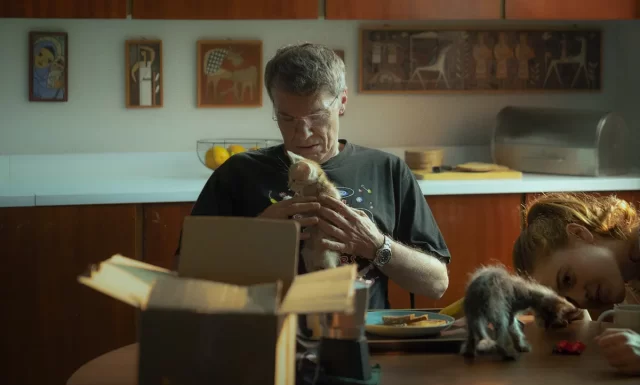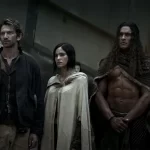Moon, 66 Questions: Don’t Give Up Until, by David Bax

Anyone who’s spent a fair amount of time at film festivals, or at least watching festival-type movies, might think they’d be able to guess at the overall feel, if not the specific plot, of Jacqueline Lentzou‘s Moon, 66 Questions based on its very festivalish title alone. And, the thing is, they might not even be entirely wrong. The aesthetics are there, from the pale European sunlight to the subjective, following, Dardenne-style cinematography. But the efforts of Lentzou and her lead actor, Sofia Kokkali, put the movie in the upper reaches of what films in this strata can be.
Moon, 66 Questions also belongs to another category, one that seems to be quite strong in the last year or so of cinema. Like Gaspar Noé‘s Vortex or Scott McGehee and David Siegel‘s Montana Story, it’s a movie about ailing elders and the adult children looking after them. As with the characters in the latter, tending to a sick father brings up the past (here suggested by VHS quality home movies) for Kokkali’s Artemis. Unlike that brother and sister pair, though, she’s contending with this psychological turmoil almost entirely on her own.
Not literally, of course. Her father (Lazaros Georgakopolous) is there but he’s not always there; or, perhaps he’s always there but he’s not always her father. In any case, Artemis spends a lot of time alone with her own thoughts, instances with which Lentzou allows us to sit in real time and without any score. The only music in the movie is diegetic, including one of the film’s high points, a cringe-funny scene of Artemis alone in the car in the garage listening to Daniel Johnston’s “True Love Will Find You in the End.”
If that sounds like something a disaffected teen would do, that’s by design. If Moon, 66 Questions has a dominant storyline, it’s the regression of Artemis, an adult woman, into a version of the kid she likely was when her father still had his faculties. Running around the house, playing with masks and magnifying glasses, claiming that ice cream is her favorite food… She’s becoming a child again. For different reasons and at a different pace, so is her father.
Often unable to carry on conversations with her dad, another game Artemis plays is having conversations in which she acts out both parts. We gain insights into what their relationship used to be like. Or maybe how she remembers it. Or maybe how she’d like it to have been.
Moon, 66 Questions describes itself, in onscreen text at the beginning, as “a film about love, movement, flow and the lack of them.” Whether or not such a poetic guideline will actually help frame the experience and understanding of the movie is probably up to the individual viewer. But Lentzou has definitely made a movie about lack and about the things we do and become to try and fill in the missing parts.




























